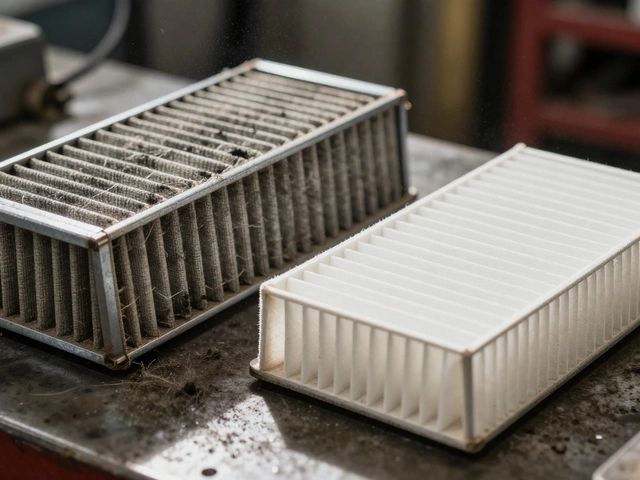Ever wondered why mechanics are always harping about changing your engine oil? It's not just for laughs or to keep their shop busy. Engine oil is like the lifeblood of your car. It keeps everything slick and smooth under the hood, minimizing friction and carrying away heat. That smooth run you're enjoying in your ride? A lot of that credit goes to fresh, clean oil.
But, hey, life gets busy, right? You skip an oil change, maybe two. What's the worst that could happen? Well, a lot. Old oil turns into sludge, messing up your engine's flow, reducing its efficiency, and, honestly, just begging for trouble.
Heat and dirt, without the oil to carry them away properly, start having a party, and your engine is the unfortunate host. Over time, this leads to wear and tear, reduces fuel efficiency, and can even cause unexpected, costly breakdowns. So, staying proactive about your oil changes isn't just about being fuss-budgety; it's smart and saves you money in the long run.
- The Role of Engine Oil
- Effects of Not Changing Oil
- Signs Your Oil Needs Changing
- Cost of Ignoring Oil Changes
- Tips for Better Oil Maintenance
- Choosing the Right Engine Oil
The Role of Engine Oil
So, why is engine oil such a big deal for your car's health? It's not just about keeping things running smoothly. This stuff does way more than you might think. First up, the primary job of engine oil is to lubricate. It keeps all those moving metal parts from grinding against each other, which means less wear and tear.
Cooling the Engine
You know how your engine gets super hot when you're driving? Engine oil helps with that too. It absorbs some of that heat and keeps your engine from overheating and sizzling up. Ever wondered why your car doesn't melt into a puddle after a long drive? Yep, thank the oil.
Cleaning and Protection
Here's something you might not know: oil actually helps clean your engine! It picks up dirt and debris along the way, keeping everything spotless inside. Without this, your engine would turn into one gunky mess. Plus, it creates a protective layer around parts, preventing corrosion. No one likes rusty bits and pieces in their engine, right?
Sealing Up Gaps
Engine oil also plays a crucial role in sealing the tiny gaps between engine parts. It creates a hydraulic seal that boosts engine efficiency. This is particularly important when it comes to the piston rings and cylinder walls, where even the smallest leak can lead to loss of power.
Any Numbers in Mind?
If you're someone who loves stats, here's a quick one for you: Proper lubrication can improve fuel efficiency by up to 2%. That might not sound like much, but over time, it definitely adds up on those long road trips!
In a nutshell, skipping regular oil changes doesn't just wear out your engine; it sidesteps all these crucial roles that oil plays in keeping your car fast, efficient, and cost-effective. Keep that oil fresh, and your ride will thank you by staying reliable and rugged on the road.
Effects of Not Changing Oil
Let's get real: ignoring your oil change schedule isn't just playing with fire; it's practically asking for an engine meltdown. So what exactly goes wrong when you skip it?
Increased Friction and Wear
Think of engine oil as a slick bodyguard for your engine parts, reducing friction. When oil ages, it loses its lubrication properties, turning thick and gunky. Without that slipperiness, metal parts grind against each other, causing wear and tear much faster than you might expect.
Overheating Issues
No surprises here. Clean oil carries away heat generated from the engine, keeping it cool. But when the oil's old and dirty, it can't handle the heat as effectively. Over time, this leads to overheating, which can cause critical engine components to warp or even crack. Yikes!
Fuel Efficiency Drops
Feeling that fuel gauge drop faster than usual? Old oil might be the culprit. With more friction in the engine, your car has to work harder to run, guzzling more gas in the process. The result? You find yourself pulling up to the pump more often.
Sludge Build-Up
Leave oil too long, and it morphs from a fluid into a thicker sludge, thanks to accumulated dirt and debris. This sludge clogs the engine, blocking the pathways that oil usually travels through. Imagine cholesterol in human arteries—never a good thing.
Costly Repairs
Last but definitely not least: the dreaded mechanic's invoice. Ignoring routine oil changes can lead to severe engine damage. And once things start breaking down under the hood, repair bills can skyrocket into the thousands.
Taking time for a regular oil change is a small price to pay to avoid these issues. So, the next time you're tempted to skip it, remember what your car is silently begging for—a little attention and some fresh engine oil.
Signs Your Oil Needs Changing
How do you know when it's time to change that engine oil? Your car starts giving you little hints, and ignoring them is like not paying attention when your partner starts dropping hints about an upcoming anniversary. Not a good idea!
1. The Engine Oil Light
The most obvious (and alarming) sign is the oil change light on your dashboard. Think of it as your car's way of waving a red flag. If this light comes on, check the oil level ASAP. Sometimes it's just a top-up it needs, but often it's a call for a complete change.
2. Dark and Dirty Oil
If you pull out the oil dipstick and can't see through the oil because it's black and grimy, that's a huge tip-off. Fresh oil should be a transparent amber. Once it's dark and dirty, it's not doing its job as effectively and it's time to swap it out.
3. Increased Engine Noise
Are you suddenly noticing your engine sounding like an angry grizzly? Fresh oil helps lubricate engine parts to keep them quiet. Without it, you'll start to hear those parts rubbing together, and that's a sound nobody wants to hear.
4. Exhaust Smoke
Clear exhaust is normal, but if you start seeing blue or dark smoke, there's something off. It could be that the oil is way past its prime, causing burning and smoking. Get that checked pronto!
5. Mileage Marker
Last but definitely not least, mileage is a huge indicator. Most cars have a recommended oil-change interval, somewhere around every 3,000 to 5,000 miles. Check your manual to know when you're due for each oil change.
Ignoring these signals is like ignoring a baby crying — something's up, and it needs attention fast. Stick to regular maintenance, and your engine health will thank you!

Cost of Ignoring Oil Changes
Let's face it, skipping an oil change might seem like a small thing—until it isn't. Ignoring this simple task doesn't just ding your car's engine health; it can drain your wallet.
One of the biggest hits? Engine repairs. When old oil turns into sludge, it's like asking your engine to run a marathon while carrying weights. If the engine parts wear out prematurely, you're looking at repairs that can range from hundreds to thousands of dollars. Compare that to the average cost of an oil change, which is often under a hundred bucks.
The Fuel Efficiency Factor
An engine running on gunked-up oil has to work harder, which guzzles more gas. If you're noticing more frequent trips to the gas station, it might be time to reconsider when your last oil change was.
Dealing with Overheating Costs
Poor lubrication leads to overheating. Your car might start stalling or, worse, leave you stranded. The cost of a tow, emergency mechanic, and, possibly, a new engine? Ouch. Much more than just swapping out old oil for new.
Here's a little scenario table to think about:
| Issue | Cost Range |
|---|---|
| Engine Overhaul | $2,000 - $4,000 |
| Increased Fuel Spend Per Year | Up to $400 |
| Diminished Resale Value | Potential loss of $1,000+ |
Ultimately, avoiding that quick trip for an oil refresh might lead you to unexpected expenses. So, keep an eye on those engine oil changes and save yourself a financial headache down the road.
Tips for Better Oil Maintenance
Keen on keeping your car running like a dream? The right attention to your engine oil can make all the difference. It's not rocket science; just a few mindful steps can go a long way.
Stay on Schedule
Remembering to change your oil regularly is half the battle. Most car manuals recommend an oil change every 5,000 to 7,500 miles, but always double-check your specific car model's guidelines.
Choose the Right Oil
Not all oils are created equal. Select the engine oil recommended by your car's manufacturer. Factors such as viscosity and synthetic vs. conventional can affect performance, so sticking with their advice is a safe bet.
Regularly Check Oil Levels
To prevent unpleasant surprises, make it a habit to check your oil every month. Use the dipstick to ensure the oil level is within the safe range and that the oil is still clean. If it's dark or gritty, it’s time for a change.
- Park your car on a level surface.
- Turn off the engine and wait a few minutes for it to cool.
- Remove the dipstick, wipe it clean, then insert it again fully.
- Remove it once more and check the level against the indicators.
Listen to Your Car
Your vehicle often gives you signs when something's off. If your car is louder than usual or if the oil change light comes on, don't ignore it. These are your car's SOS signals.
Use Quality Filters
Oil filters play a crucial role in trapping dirt and debris. A good quality filter ensures your engine oil stays clean longer, enhancing your engine's performance and lifespan.
Finally, a little pro tip: Keep your receipts and notes from each oil change in a logbook. It helps you keep track and can come in handy if you ever sell the car.
Choosing the Right Engine Oil
Picking the engine oil for your car isn't as daunting as it may seem. It's more than just about brand loyalty—it's about what's best for your engine.
Understand the Oil Types
First up, get familiar with the types of oil available. You've got conventional, synthetic, and a blend of both. Synthetic oil is like the premium option—great for high performance and extreme temperatures because it flows better and resists breaking down. But if you're rocking an older car, conventional oil might do just fine.
Check the Viscosity Grades
Viscosity is just a fancy term for how thick or thin the oil is, and it's essential for keeping your engine happy. You'll see something like 5W-30 on your oil bottle. The '5W' stands for how the oil behaves in colder temperatures, while the '30' is its thickness when hot. Stick to what your car manufacturer suggests, and you'll be golden.
"Using the right oil viscosity is crucial for engine protection; incorrect levels can lead to reduced performance and increased engine wear." – Automotive Expert, Jane McAdams
Don’t Forget the Additives
Some oils come with additives that can clean your engine, prevent rust, and reduce friction. While it might sound like overkill, these additives could prolong your engine’s life, especially if you're in stop-and-go traffic a lot or have long commutes.
Consider Your Driving Conditions
If you live in a super cold or hot area or take short trips regularly, these factors can affect your choice. Cold weather might call for thinner oil, while hot climates might need something thicker. Taking note of your environment can help prevent any unpleasant surprises.
Price vs. Quality
Sure, you want to save money, but going cheap on oil changes could cost you in the long run. High-quality oil might be pricier, but it could mean fewer trips to the shop and a longer-lasting engine.
Really, choosing oil comes down to knowing your car, your area, and your driving style. Once you've got those nailed down, picking the right oil gets a whole lot simpler.
| Oil Type | Best For |
|---|---|
| Conventional | Older Cars |
| Synthetic | High Performance, Extreme Temps |
| Synthetic Blend | Middle Ground, Balance of Benefits |




